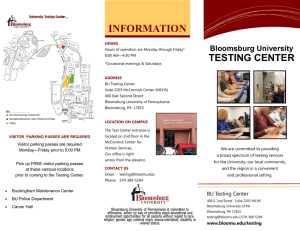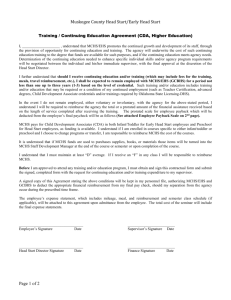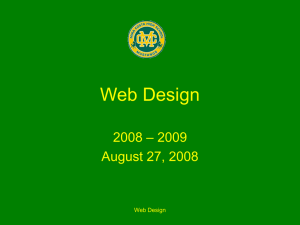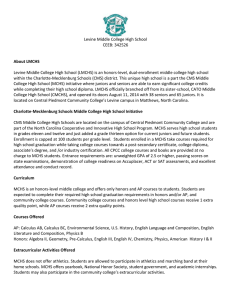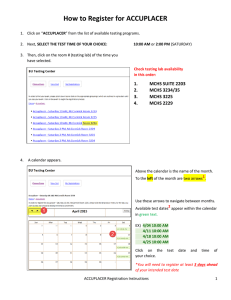Fourth Annual A Welcome From the Conference Co-Chairs
advertisement
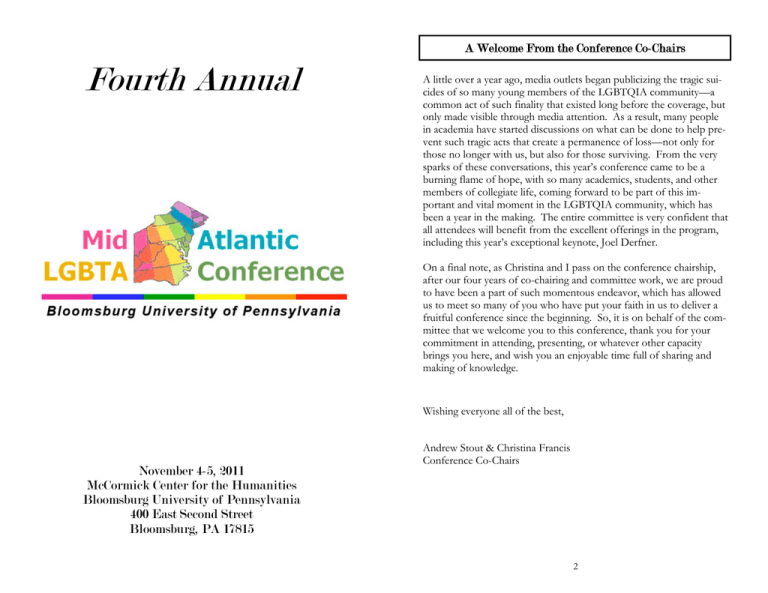
A Welcome From the Conference Co-Chairs Fourth Annual A little over a year ago, media outlets began publicizing the tragic suicides of so many young members of the LGBTQIA community—a common act of such finality that existed long before the coverage, but only made visible through media attention. As a result, many people in academia have started discussions on what can be done to help prevent such tragic acts that create a permanence of loss—not only for those no longer with us, but also for those surviving. From the very sparks of these conversations, this year’s conference came to be a burning flame of hope, with so many academics, students, and other members of collegiate life, coming forward to be part of this important and vital moment in the LGBTQIA community, which has been a year in the making. The entire committee is very confident that all attendees will benefit from the excellent offerings in the program, including this year’s exceptional keynote, Joel Derfner. On a final note, as Christina and I pass on the conference chairship, after our four years of co-chairing and committee work, we are proud to have been a part of such momentous endeavor, which has allowed us to meet so many of you who have put your faith in us to deliver a fruitful conference since the beginning. So, it is on behalf of the committee that we welcome you to this conference, thank you for your commitment in attending, presenting, or whatever other capacity brings you here, and wish you an enjoyable time full of sharing and making of knowledge. Wishing everyone all of the best, November 4-5, 2011 McCormick Center for the Humanities Bloomsburg University of Pennsylvania 400 East Second Street Bloomsburg, PA 17815 Andrew Stout & Christina Francis Conference Co-Chairs 2 Keynote Speaker Born in Charleston, South Carolina, where his great-grandmother had had an affair with George Gershwin, Joel Derfner fled the South as soon as he possibly could, and went on to receive his B.A. in linguistics from Harvard. A year after he graduated, his thesis on the Abkhaz language was shown to be completely wrong, as the word he had been translating as “who” turned out to be not a noun but a verb. Realizing astutely that linguistics was not his métier, he moved to New York to get an M.F.A. in musical theater writing from New York University’s Tisch School of the Arts. He dated the man he thought was his True Love for two and a half years; the exquisite pangs of bitterness he felt at their breakup and the consequent depravities into which he threw himself resulted in his first book, Gay Haiku (Broadway, 2005): “I’m coming!” you shout, As if no one had ever Managed it before. Gay Haiku went into a second printing within two weeks of its release. His realization that work in publishing is both more secure and better paid than work in musical theater (alas, he’s not kidding) resulted in his second book, Swish: My Quest to Become the Gayest Person Ever and What Ended Up Happening Instead (Broadway, 2008), re-released a year later in paperback with a foreword by Elton John, who writes, “Swish is the most moving book I’ve ever read about being gay. But it’s not just about being gay; it’s about being human.” He is currently at work on a third book, tentatively titled Lawfully Wedded Husband: How I Tried to Destroy America With My Gay Marriage. (Joel’s biography continues on the next page.) 3 Continuation of Keynote Speaker’s Biography Periodicals for which Joel has written include Out, The Advocate, Time Out: New York, Genre, HX, and other print organs some of which are even still in distribution. (He’s also written for several periodicals that have gone the way of all flesh, but he wishes to point out that in none of these cases is he responsible for the failure of the magazine, not even the one whose editor slept with him and then never paid him for his article, though he will admit to a feeling that in this case the magazine got what was coming to it.) In 2010 he co-starred in Sundance Channel’s reality soap Girls Who Like Boys Who Like Boys as the nervous groom accompanied on his way to the altar by his inexplicably single friend Sarah. The season finale showed his wedding in Iowa, the first legal wedding of a samesex couple in America on television. Musicals to which he has composed the scores include Signs of Life (book by Peter Ullian and lyrics by Len Schiff), produced offBroadway in 2010, Postcards From Another Planet (book and lyrics by Tony Award winner Rachel Sheinkin), produced in London in 2004, and Spirit Child (book and additional lyrics by John Herin), commissioned by and produced at the Thomas Pullen School for the Arts in Washington, D.C. Other current projects include Another Annette (book and lyrics by Mindi Dickstein) and Cthusical (book by Peter Ullian and lyrics by Len Schiff). Joel is a grateful alumnus of the Graduate Musical Theater Writing Program at NYU, where he is now on the faculty. Joel also is or has been a knitter, cheerleader, actor, singer, aerobics instructor, go-go boy, and primary-school math teacher. He lives in Brooklyn with his husband—a psychiatrist too blinded by his charms to realize what he’s gotten himself into—and two small, fluffy dogs. He has been fired by the Public Theater, Harvard University, and the Anglo-Catholic Church. Joel’s book, Swish: My Quest to Become the Gayest Person Ever and What Ended Up Happening Instead will be on sale in the lobby of McCormick during the conference! 4 Session B Friday, November 4, 2011—Pre-Conference Schedule 7:30-11:00PM: Events and Networking 7:30: Conference Pre-registration begins 8:00-10:00: Drag Show & Bingo Miss Sharon Husbands, Grand Hostess 10:00-11:00: Networking Saturday, November 5, 2011—Conference Opening 8:00-9:00AM: Registration & Breakfast sponsored by EqualityPA (McCormick Center Lobby) 9:00-9:10AM: Welcome & Introduction (MCHS 1303) Christina Francis and Andrew Stout, Co-Chairs Adrian Shanker and Ted Martin, EqualityPA Session A 9:15-10:15: A1: “GSA Advisor Best Practices” (MCHS 1303) Blaise Liffick (Millersville University) Matthew Simmons (East Stroudsburg University) Sheleta Webb (California University) A2: “Pathways to Inclusion of African-American Lesbian, Gay, Bisexual, and Transgender Students at Predominately White Universities (PWUs)” (MCHS 1316) Catherine J. Massey (Slippery Rock University) Colleen Cooke (Slippery Rock University) A3: “Overcoming Oppression and Celebrating Love: An Improv” (MCHS 2303) Jennifer Joy Pawlitschek A4: “Leadership: How to Assist, as a Leader, Members Coming Out” (MCHS 2314) Kirk M. Allen (Walden University) 5 10:30-11:45AM: B1: “‘Making it Better’—The Critical Work of an LGBTA Commission and Equality Pennsylvania and Students” (MCHS 1303) Mark Usry (Bloomsburg University) Craig Young (Bloomsburg University) Jen Bayer (Bloomsburg University) Asa Kelley (Bloomsburg University) Greg Hummel (Bloomsburg University) B2: “Parenting with Pride: A Psychoeducational Curriculum for Parents of LGBTQ Youth” (MCHS 1316) Laryssa Husiak (Columbia University) B3: “Religion and the LGBTQ Community” (MCHS 2303) The Rev. Dr. Joel Zeiders The Rev. Canon Marjorie Menaul The Rev. Dr. Karl Polm-Faudre Rabbi Serena FujitaPanelists The Rev. Darlene Little John Shirley, Moderator (Bloomsburg University) B4: “Happiness is a Virtue” (MCHS 2314) Joshua Hunold (Alumnus, University at Buffalo, SUNY) Lunch and Keynote (Kehr Union Ballroom) 12:00-12:10PM: Greetings & Remarks from the Assistant Vice President of Academic Affairs Dr. Jonathan M. Lincoln 12:10-1:00PM: Lunch 1:00-2:00PM: “Congratulations! It May Already Have Gotten Better!” Joel Derfner, Keynote Speaker 6 Session C Session E 2:15-3:15PM: 4:45-5:45PM: C1: “Making Church Better” (MCHS 1303) Tedd Cogar (Indiana University) Brian Patchoski (Pennsylvania State University) E1: “Putting the Pieces Together” (MCHS 1303) Jon Hurst (University at Buffalo, SUNY) Samantha Janosick (University at Buffalo, SUNY) C2: “Making Campus Housing Better: Winning Gender Neutral Housing on Your Campus” (MCHS 1316) Aaron Bova (Muhlenberg College) Adrian Shanker (Pennsylvania Diversity Network) E2: “Where are the Gay Girls?: Re-cognizing Homophobia” (MCHS 1316) Cori Wong (Pennsylvania State University) C3: “WorkshopThe Passing Problem: Framing Passing as the Prevention of Trans Community Mobilization” (MCHS 2303) Taylor Roberts (Bloomsburg University) C4: “Queering Sex Education: Rural Sex Educators’ Treatment of Queer Issues” (MCHS 2314) Jennifer M. deCoste (Clarkson University) E3: “Coming out or Coming of Age? Do People Still Come Out?” (MCHS 2303) Andy Dunlap (Shippensburg University) E4: “Grand Rounds: Student Driven Training Model for LGBT Cultural Competence in Clinical Psychology Graduate Training” (MCHS 2314) Shana D. Stites (Chestnut Hill College) Natalie Nageeb (Chestnut Hill College) Session D Closing 3:30-4:30PM: D1: “Inclusive Sexual Moralities: A Defense of LGBTA Sexual Relationships” (MCHS 1303) Richard McCarty (Mercyhurst College) 6:00PM: Closing (MCHS 1303) Christina Francis and Andrew Stout, Co-Chairs D2: “Transgender Students in Higher Education—How We Can Make It Better” (MCHS 1316) Nikkie Hockenberry (Alfred State College) D3: “Perception, Participation, and Productivity: LGBTQA Communities in the STEM Fields” (MCHS 2303) Eric Patridge (Yale University) Denise Conner (Pennsylvania State University) D4: “Creating LGBTQIA Safe Environments in Large Classrooms” (MCHS 2314) Daniel Burdick (Edinboro University) 7 8 Session Descriptions—A Sessions are listed in chronological order. A1: This session will provide GSA advisors with the best practices for developing and maintaining a student-led GSA on campus. Along with encouraging staff to work with their GSA student leaders to maintain the organization and to support the GSA advisors themselves, we will be providing time for an open discussion and networking. A2: This session will focus on “bridging the gap” among the African American LGBT community and the larger campus community at a predominantly white university (PWU). The session will discuss objectives such as developing steps to make individual PWU campuses more inclusive to LGBT African-American students. A3: In this energetic, joy-filled workshop, attendees will participate in a series of improvisational games designed to free creativity and encourage deeper self-expression. These games, which incorporate queer history and culture, also help to establish and build group dynamics. Conference participants will be able to use these exercises to help LGBTQA young adults work through pain, find joy, learn queer history and connect more easily in groups. A4: This seminar will address coming out and how to both identify and invite individuals conflicted with their process of choices. Coming out is usually the most salient and difficult part of matriculating into society with confidence and pride. As a leader, understanding how to approach and support individuals of all ages is important to being effective within the LGBTQ community. This discourse will assist student leaders by fostering an open and positive environment within their respective campus community. 9 Session Descriptions—B B1: This session will update participants on the state of LGBTA issues in Pennsylvania and the critical need for student activists on college campuses. Participants will better understand options for organization structure of an LGBTA Commission; along with better understanding visibility, activism and the need for social events. B2: “Parenting with Pride” is a psychoeducational curriculum designed to support parents with adolescents ages 10 to 14 who have recently come out as lesbian, gay, bisexual, transgender or questioning (LGBTQ). Utilizing the principles of psychoeducation, “Parenting with Pride” emphasizes the parental experience while concurrently bolstering protective factors within the families of LGBTQ youth. The first part of this presentation will begin with an overview of this newly developing curriculum and then transition into a larger discussion around specific strengths, needs and challenges faced by families with LGBTQ youth, ultimately working towards “Making it Better.” B3: This panel addresses the religious/spiritual concerns of the LGBTQ community. Over the past few decades various faith traditions have striven to meet the needs of the community, and for this reason the panel is comprised of a variety of clergy representing affirming religious institutions and groups. B4: "Everything came back negative, except for one. Which one do you think it was?" That's how I found out my status. And that's when I decided to live. 10 Session Descriptions—C C1: This session will explore the differences between denominational approaches toward homosexuality and how two specific, mainline Protestant denominations are queer affirming. The session will also provide explanation of specific Biblical references that are used to exclude queer individuals from faith traditions, along with providing new interpretations and understandings of Biblical texts which will allow individuals to counter and inform others of how texts have been misused. C2: Gender Neutral Housing options are one of the best ways to ensure safety for LGBT identified students on college campuses. This workshop, led by Aaron Bova, The Senior Associate Director of Residential Life at Muhlenberg College, and Adrian Shanker, Vice President of Pennsylvania Diversity Network, will provide an interactive environment to create a winning message for Gender Neutral Housing on your campus. Aaron has implemented a gender neutral housing policy, and Adrian has advocated for them (and won), their unique perspectives will be useful for anyone interested in running a campaign on your campus. C3: This presentation will explore the concept of passing and its implications on the trans community as a whole. Passing tends to be strictly enforced upon those who practice non-normative gendering, and the consequences of this standard of passing effect not only the transgendered individual, but the transgender community. This presentation will assert that this gender policing restricts the transgender community from mobilizing and creating a civil rights movement in the way that other oppressed communities have in the past. C4: The purpose of this study was to explore how rural sex educators create environments that are inclusive to queer students. The normative experiences of sex education in the United States guided this qualitative study that was informed by queer theory and ethnography. Examined within these normative experiences are the implications of policy and curricula, the impact this has on queer students, and teacher responses to the injustice of normalizing practices. Also discussed is an analysis of rural queer students and teachers, and an evaluation of the silence of rural queerness. Challenging definitions, such as sex education, rural, and queer—along with the tension of using the word queer in non-academic settings—are also addressed. 11 Session Descriptions—D D1: For too long the ethics of sex and sexuality has been dominated by religious and political "traditionalists" who have wielded a narrow, and thus easily marketable definition of sexual morality. If we are to create a social environment in which it truly "gets better" for LGBTA people, we must attend to the moral and religious arguments that are used so pervasively against us. While concepts of sexual virtue have tended to promote only abstinence or a heterosexual norm, I argue that LGBTA people can legitimately recapture concepts of sexual virtue that resonate with our community's commitments to inclusivity. D2: This session will offer a look at the current policies (or lack thereof) in institutions of higher education that are in place for transgender students. We will also look at what some schools are doing that is making it better for transgender students to live on campus and to attend classes at their institution. The attendees will learn about the policies, discuss personal experiences relevant to the topic, develop ideas to bring back to their campus for National Transgender Awareness Day and learn about films relevant to the topic. D3: There are only a few resources dedicated to enhancing the development of LGBTQA students, with virtually none focused on crossroads between LGBTQA communities and STEM (Science, Technology, Engineering & Mathematics). This workshop will focus on the current state of the STEM fields as they relate to LGBTQA communities, highlighting changes that would improve our long term ability to succeed throughout academic and professional arenas. Participants will leave with an understanding of STEM infrastructure and with tools to improve academic and professional experiences for LGBTQA people entering the STEM fields. D4: This session will address challenges that LGBTQIA student and instructors face in a large classroom will be addressed. These challenges include classroom management techniques, advantages and disadvantages of coming out in a large classroom and encouraging LGBTQIA students/faculty to speak up in large classes. 12 Session Descriptions—E E1: The stages of identity that students explore will be present in this session. This session will examine the intersection of race, sexual orientation, and gender identity. Attendees will gain a better understanding of how these components impact the identity development process of LGBTQ students. E2: In light of the public attention afforded to the multiple suicides of young gay boys last fall, I ask, "Where are the gay girls?" in order to highlight multiple forms of homophobia that differently target boys and girls. Some argue that homophobic bullying is more directed at boys than girls. Even if this is so, I suggest that an operation of homophobia which significantly affects girls can be recognized in the form of an epistemology of ignorance--not a mere lack of knowledge, but a produced inability to know about queer sexuality that is sustained by the erasure, misrecognition, or dismissal of queer and fluid sexuality, as evidenced by the lack of news coverage of three young lesbians' suicides that also occurred last fall. If outreach programs fail to appreciate these varied forms of homophobia they risk being inadequate and ineffective, or worse, they risk further alienating queer youth. Conference Committee Christina Francis, Co-Chair Andrew Stout, Co-Chair Janice Broder Jean Downing Jason Godeke Asa Kelley John Shirley Anna Turnage Sponsors The College of Liberal Arts The Office of Social Equity The Department of English The Department of Music, Theatre, and Dance The LGBTA Commission The SOLVE Office E3: This workshop seeks to situate the process of developing a positive sense of minority sexual orientation identity within a changing historic context. What is it like to come out now, versus, what was it like to come out in past generations? Session participants will be invited to consider what implications these findings have for their area of research, practice or policy. E4: This program promotes the exchange of information about LGBT culture. After this session, attendees will be able to describe: how LGBT student groups can productively contribute to curricula while increasing awareness of LGBT issues; how the grand training model can facilitate LGBT culture competence among graduate students and how this adaption of grand rounds can foster collaboration and networking among students, facility, and professionals in the local community. 13 14
